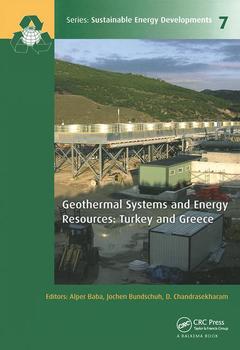Geothermal Systems and Energy Resources Turkey and Greece Sustainable Energy Developments Series
Coordonnateurs : Baba Alper, Bundschuh Jochen, Chandrasekharam D.

In the region comprising Turkey and Greece, people have been using water from geothermal sources for bathing and washing of clothes since ancient times. This region falls within the Alpine-Himalayan orogenic belt and hence is a locus of active volcanism and tectonism and experiences frequent seismic events. This volcanic and tectonic activity has given rise to over 1500 geothermal springs. Its importance was recognized decades ago and the geothermal water is now being utilized for district heating, industrial processing, domestic water supply, balneology and electric power generation. The geothermal potential in this region is large. In Turkey alone it is estimated to be more than 31500 MWt while the proven potential is 4078 MWt. At present 2084 MWt is being utilized for direct applications in Turkey and 135 MWt in Greece. In Turkey electricity is produced for 166 MW installed capacity, whereas in Greece geothermal energy is presently not used for electricity production despite its potential.
This book discusses the geochemical evolution of the thermal waters and thermal gases in terms of the current volcano-tectonic setting and associated geological framework that makes the region very important to the geothermal scientific community. The book explains, in a didactic way, the possible applications, depending on local conditions and scales, and it presents new and stimulating ideas for future developments of this renewable energy source. Additionally, the book discusses the role(s) of possible physicochemical processes in deep hydrothermal systems, the volatile provenance and relative contributions of mantle and crustal components to total volatile inventories. It provides the reader with a thorough understanding of the geothermal systems of this region and identifi es the most suitable solutions for specifi c tasks and needs elsewhere in the world. It is the fi rst time that abundant information and data from this region, obtained from intensive research during the last few decades, is unveiled to the international geothermal community. Thus, an international readership, in the professional and academic sectors, as well as in key institutions that deal with geothermal energy, will benefit from the knowledge from geothermal research and experiences obtained from the Aegean Region.
Date de parution : 03-2014
17.4x24.6 cm
Disponible chez l'éditeur (délai d'approvisionnement : 14 jours).
Prix indicatif 293,12 €
Ajouter au panierDate de parution : 01-2019
17.4x24.6 cm
Disponible chez l'éditeur (délai d'approvisionnement : 14 jours).
Prix indicatif 105,47 €
Ajouter au panierThèmes de Geothermal Systems and Energy Resources :
Mots-clés :
Ground Heat Exchanger; field; Central Anatolian Crystalline Complex; fluid; Bouguer Gravity Anomaly Map; water; Exergy Loss Rate; north; Geothermal Power Plants; anatolian; Exergy Efficiency Values; fault; Geothermal Fluids; areas; Thermal Waters; waters; Geothermal Field; reservoir; Geothermal Waters; temperature; Geothermal System; Geothermal Reservoir; Cation Geothermometers; North Anatolian Fault Zone; Back Arc Regions; GSHP System; TDS Value; Lacustrine Units; Exergy Analysis Method; Magnetotelluric Method; Exergy Efficiency; North Anatolian Fault System; South Aegean Sea; Gas Geochemistry; Spiniferites Ramosus



